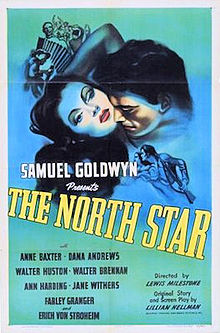
NORTH STAR
US, 1943, 105 minutes, Black and white.
Anne Baxter, Farley Granger, Jane Withers, Dana Andrews, Walter Brennan, Erich Von Stroheim, Dean Jagger, Ann Harding, Carl Benton Reid, Walter Huston.
Directed by Lewis Milestone.
North Star is a propaganda film of 1943. It is very heavily done, written by left-wing sympathiser playwright Lillian Hellmann with music by Aaron Copland. It was directed by Lewis Milestone, a veteran of many excellent war films including All Quiet on the Western Front and The Purple Heart and A Walk in the Sun. It has a great number of character actors and emerging stars like Walter Huston as well as Dana Andrews, Anne Baxter and Farley Granger.
The film shows a sympathy for the people of the Soviet Union in the war effort. It presents them in a kind of Never- Never Land, a singing and dancing people just like the Americans. (It has some tones of films like The Sound of Music.)
However, once the Nazis invade, there are some good war action scenes, culminating in a final rousing speech by Anne Baxter.
This film, along with Mission to Moscow and Song of Russia, made at the same time, were later heavily criticised and withdrawn from circulation during the Cold War period.
1. War propaganda? The '40s? The influence of propaganda on the film-making?
2. The history of the film, the propaganda for collaboration with the Soviet Union in the war effort? The Cold War hostility towards the film?
3. The contribution of the makers: the reputation of Lillian Hellmann, Aaron Copland, Lewis Milestone? The cast?
4. The black and white photography, the village settings, the action sequences? The propaganda film and its impact? Comparisons with stories of other countries involved during the war?
5. The village: the parallels with American towns, the family life, the school, exams, vacations, relationships?
6. The picnic, the outings, the songs? The happy village? The young people walking to Kiev?
7. The sketches of the characters rather than strong portrayals? The adult generation, the grandfather, the doctor, the children?
8. The trip to Kiev, walking and singing, on the wagon? The air attack?
9. The air raids, the deaths, the villagers meeting, the decision to be either guerrillas or stay at home to thwart the Nazis?
10. The sequences of the guerrilla raids, effective war film?
11. Those remaining at home, the invasion of the Nazis, the burning of the village and the crops?
12. The sketch of the Nazis themselves, the occupation, taking the children for blood, the attacks and fights in the village, deaths?
13. The doctor, his wry comments about Russia and its fighting power? About the Nazis? About his Jewish instructors? Seemingly sympathetic, taking the blood, his being a sympathiser - and the attack by the doctor, his death?
14. A picture of the resistance? And the final speeches?